KPMG: AI's Extensive Adoption in Healthcare
KPMG: 85% of healthcare firms now build AI in-house—driving innovation, efficiency, and patient care


The healthcare industry stands at a transformative crossroads, where artificial intelligence is no longer a distant promise but an operational reality. KPMG's latest comprehensive research reveals that AI adoption in healthcare has reached unprecedented levels, with 85% of healthcare organizations developing AI solutions in-house.
This shift from experimentation to implementation marks a pivotal moment in how healthcare systems worldwide are embracing AI innovation to address critical challenges ranging from workforce shortages to operational inefficiencies.
McKinsey Report: How Generative AI is Reshaping Global Productivity and the Future of Work. Read more here!
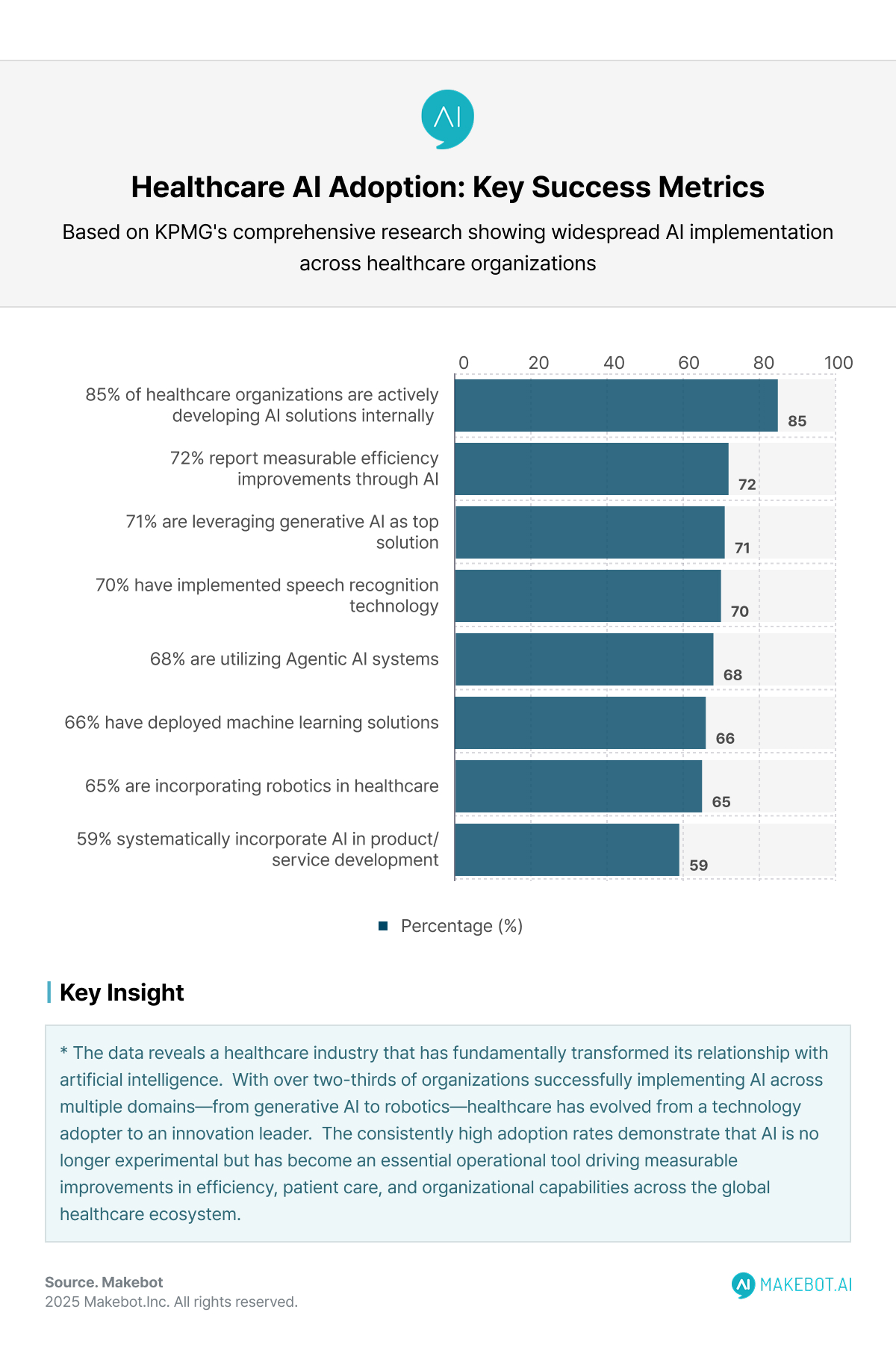
The Current State of AI Implementation in Healthcare
The research findings paint a compelling picture of an industry in transition. 59% of healthcare organizations have systematically incorporated AI into product and service development, while 72% report achieving efficiency improvements through AI implementation. This data contradicts the perception that healthcare is a laggard in technology adoption, positioning it instead as a sector actively pursuing AI in healthcare solutions.
KPMG's Global Head of Healthcare, Dr. Anna van Poucke, emphasizes this transformation: "AI has the potential to fundamentally reshape healthcare — not by replacing the human touch, but by enhancing it. By integrating AI across different clinical and community settings and different operational streams, we can improve outcomes, ease the burden on healthcare workers, and create more resilient, patient-centered health systems."
Technology Investment and Market Impact
The financial commitment to AI in healthcare is substantial. 32% of healthcare leaders say AI represents greater than 10 percent of their organization's global technology budget, indicating a significant shift in resource allocation. This investment is driving market growth, with GlobalData research forecasting that the AI market in healthcare will reach a valuation of around $19 billion by 2027.
The top applications driving this growth include:
- Generative AI (71%)
- Speech recognition (70%)
- Agentic AI (68%)
- Machine learning (66%)
- Robotics (65%)
Regional Perspectives
The APAC region presents unique opportunities for AI in healthcare implementation. As healthcare systems in countries like Australia, Japan, South Korea and emerging markets in Southeast Asia grapple with aging populations and resource constraints, AI offers scalable solutions.
KPMG's research indicates that regional healthcare leaders are particularly focused on leveraging AI for population health management and remote care delivery.
In Australia specifically, healthcare organizations are pioneering digital literacy initiatives. "We are running a lot of our digital literacy courses inside the organization to make sure that people are more aware of AI. We are partnering with one of the Australian Universities called RMIT, to run an internal course over the next six to eight months," reports one Chief Technology Officer from the region.
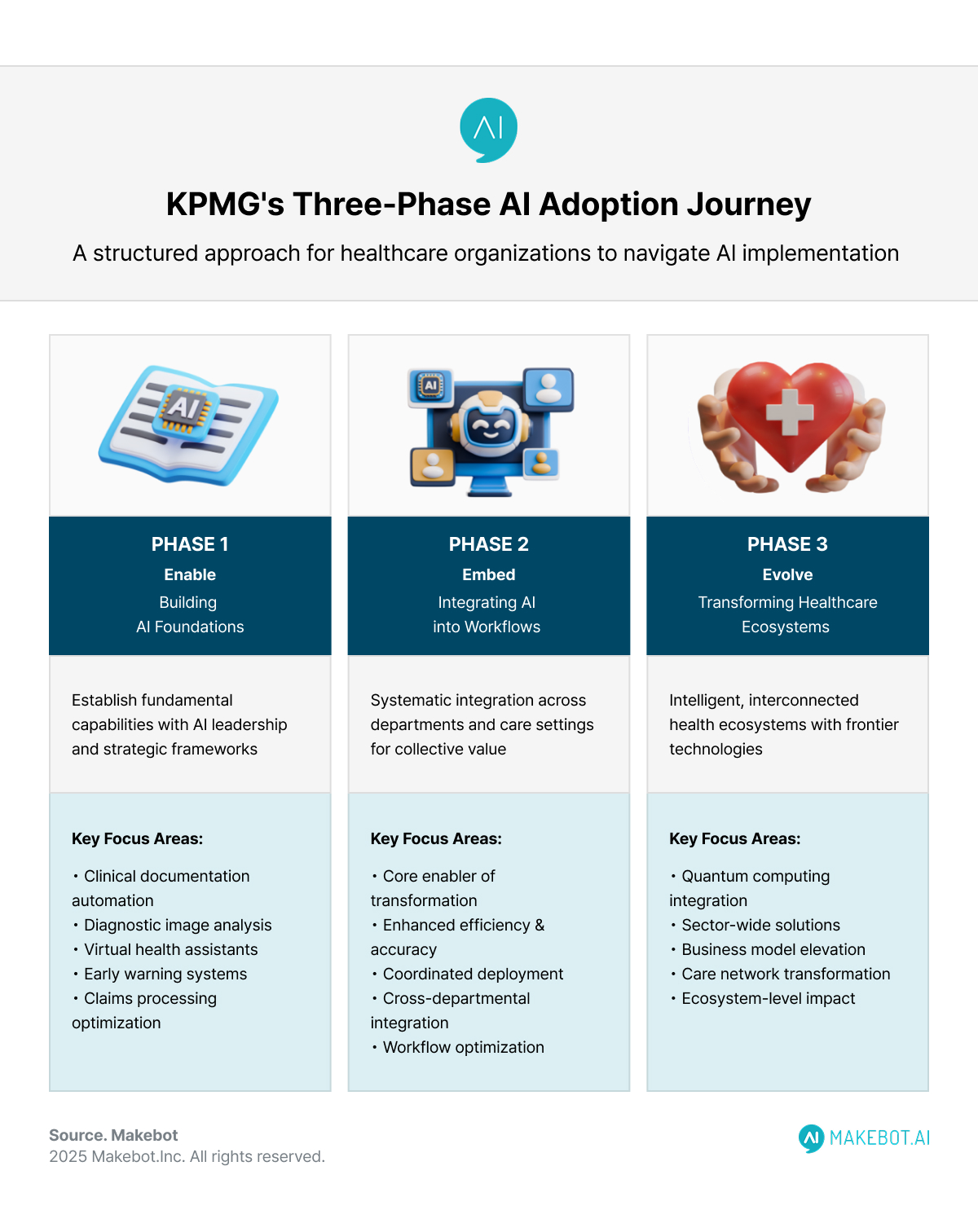
The Three-Phase Journey
KPMG has identified a structured approach to AI adoption through three distinct phases that healthcare organizations must navigate:
Phase 1: Enable - Building AI Foundations
The Enable phase focuses on establishing fundamental capabilities. Healthcare organizations appoint AI leadership, develop strategic frameworks, and launch targeted pilot programs. Organizations leverage cloud-based AI platforms and pre-trained medical AI models with minimal customization, reducing complexity while gaining early benefits.
Key focus areas include:
- Clinical documentation automation using generative AI
- Diagnostic image analysis support
- Virtual health assistants for patient communication
- Early warning systems for patient deterioration
- Back-office claims processing optimization
Phase 2: Embed - Integrating AI into Workflows
The Embed phase represents the transition from experimentation to systematic integration. AI is no longer a standalone tool but a core enabler of healthcare transformation, enhancing efficiency, clinical accuracy, and workforce productivity. This phase requires coordinated deployment across value streams, connecting departments and care settings to unlock collective value.
Phase 3: Evolve - Transforming Healthcare Ecosystems
The most advanced phase involves creating intelligent, interconnected health ecosystems. Organizations use AI and frontier technologies like quantum computing to elevate business models and ecosystems to solve large sector-wide challenges. This transformation extends beyond individual organizations to encompass entire care networks.
Latest AI Breakthroughs Driving Healthcare Innovation
The emergence of generative AI has catalyzed significant breakthroughs in healthcare applications. KPMG's research highlights several cutting-edge implementations:
Agentic AI: The Next Evolution
84% of respondents feel comfortable with AI making end-to-end autonomous decisions for specific processes in their organization. Agentic AI represents a paradigm shift, moving beyond simple task automation to proactive identification of clinical and operational issues, solution recommendation, and collaborative action with human teams.
Real-World Applications and Value Creation
The potential value at stake is substantial. KPMG in the US analyzed the generative AI opportunity across healthcare functions, identifying a total opportunity worth US$37 billion across various organizational functions, with the highest impact areas including:
- Services & data analytics (US$15.2 billion)
- Sales (US$4.3 billion)
- Marketing (US$5.8 billion)
- Supply chain (US$3.0 billion)
- Risk management (US$2.1 billion)
Strategic Partnerships and Industry Collaboration
The healthcare AI landscape is being shaped by strategic collaborations between consulting firms and technology providers. KPMG International announces its innovative and timely work with healthcare technology company Hippocratic AI, global leader in developing safety-first generative AI healthcare agents.
This partnership addresses a critical challenge: The international healthcare sector is experiencing a significant workforce shortage, with projections indicating a shortfall of approximately 10 million health workers by 2030. Hippocratic AI's generative AI agents can perform non-diagnostic clinical tasks, potentially alleviating workforce pressures while maintaining quality care standards.
Investment in AI Infrastructure
KPMG's commitment to AI innovation extends to significant infrastructure investments. KPMG is investing $100 million to strengthen its AI consulting services with support from Google Cloud, with expectations to bring in $1 billion in new revenue over the next few years by offering smarter, AI-powered solutions.
Turning Challenges into Opportunities for Growth
While healthcare organizations encounter obstacles in AI adoption, these challenges are increasingly viewed as catalysts for innovation and progress. Rather than acting as roadblocks, they are driving forces that push organizations toward smarter strategies, stronger infrastructures, and more collaborative approaches.
Technical and Operational Advancements in Progress
A large majority (84%) of organizations report encountering operational challenges during AI implementation—yet these experiences are helping shape more resilient systems. For example:
- Data Quality (62%): Organizations are now prioritizing cleaner, standardized data pipelines, which strengthens the foundation for trustworthy AI insights.
- System Interoperability: Legacy IT hurdles are accelerating modernization efforts, leading to scalable, future-proof platforms.
- Workforce Resistance (47%): Concerns about AI adoption are fueling investments in training, upskilling, and cultural change, ultimately fostering stronger human–AI collaboration.
- Regulatory Compliance : Navigating strict regulations is encouraging the development of ethical AI practices, stronger governance, and more transparent systems—all of which will increase trust among patients and stakeholders.
Financial and Strategic Vision
While 69% of organizations feel shareholder pressure to show short-term ROI, an impressive 85% are pursuing projects where returns may not be immediate. This reflects a strategic long-term vision: leaders understand that early investments in AI build the foundation for sustained value creation in the years ahead. By adopting this perspective, healthcare organizations are not just reacting to financial pressures—they are actively shaping the future of intelligent healthcare ecosystems.
Case Study: Zuyderland Medical Center
KPMG in the Netherlands collaborated with Zuyderland Medical Center to develop a comprehensive AI strategy. Through collaborative work sessions, more than 50 ideas were generated, leading to four strategic goals for AI implementation:
- Automating business operations to reduce administrative burdens
- Enhancing healthcare demand and supply alignment within the ecosystem
- Developing new care delivery methods through AI-supported diagnostics
- Providing personalized care solutions enabling proactive treatment
This case demonstrates how AI companies and healthcare providers can collaborate effectively to create sustainable, value-driven AI implementations.
Regional Innovation
The APAC region presents unique opportunities for AI in medicine implementation. Countries like Australia, Japan, and emerging Southeast Asian markets are leveraging AI to address specific regional challenges:
Population Health Management
APAC healthcare systems are using AI to manage aging populations more effectively, with predictive analytics enabling proactive interventions and resource optimization.
Remote Care Delivery
Geographic challenges in APAC regions make AI-powered telemedicine and remote monitoring particularly valuable, extending healthcare access to underserved populations.
Cultural and Linguistic Adaptation
AI systems in APAC markets are being developed with cultural sensitivity and multilingual capabilities, ensuring broader acceptance and effectiveness across diverse populations.
AI Investments Set to Outpace Digital Tech Spending in Asia-Pacific, Driving $1.6 Trillion Economic Impact by 2027. Read here!
Future Outlook and Strategic Recommendations
KPMG's research identifies four strategic imperatives for healthcare organizations pursuing AI adoption:
1. Design AI Strategies Aligned with Core Competencies
Healthcare organizations must develop AI strategies that enhance patient and workforce experiences while improving population health and reducing costs. Focus areas should include diagnostics, administrative automation, and personalized care.
2. Build Trust into Implementation Roadmaps
Transparent, explainable AI implementations with robust ethical governance frameworks are essential for sustainable adoption.
3. Foster Human-AI Collaboration
Half of respondents say their organizations are currently developing a clear vision on how the tech can support their transformational ambitions in the next five years. AI should augment rather than replace human expertise.
4. Create Sustainable Technology Infrastructure
Modernizing legacy systems, unifying fragmented data sources, and enabling real-time AI integration form the foundation for successful implementations.
The Path Forward
The healthcare industry's embrace of AI innovation represents more than technological advancement—it signifies a fundamental shift toward intelligent, efficient, and patient-centered care delivery. As KPMG's research demonstrates, successful AI adoption requires strategic planning, stakeholder collaboration, and sustained commitment to both technological excellence and ethical implementation.
The future of healthcare lies in creating integrated, AI-enabled ecosystems that prioritize prevention, early intervention, and seamless patient journeys. Organizations that act decisively to implement comprehensive AI strategies, invest in workforce readiness, and deliver measurable value will lead this transformation.
As the healthcare sector continues evolving, the collaboration between established consulting firms like KPMG and innovative AI companies will prove crucial in translating technological potential into practical, life-improving solutions. The journey from promise to practice is underway, and the organizations that embrace this transformation thoughtfully and strategically will shape the future of healthcare delivery.
The data is clear: AI in healthcare is not a distant possibility but a present reality. The question is no longer whether healthcare organizations will adopt AI, but how quickly and effectively they can implement it to improve outcomes, reduce costs, and enhance the human experience of care.
Showcasing Korea’s AI Innovation: Makebot’s HybridRAG Framework Presented at SIGIR 2025 in Italy. More here!
AI is redefining healthcare — are you ready to keep up?
KPMG’s latest report shows that 85% of healthcare organizations are already building AI in-house, with generative AI and agentic AI leading the way in solving workforce shortages, boosting efficiency, and reshaping patient care.
This is where Makebot bridges the gap. We go beyond technology delivery, providing industry-specific LLM agents and end-to-end AI solutions tailored to your business strategy and goals.
Why Choose Makebot?
- Industry-Specific LLM Agents: From healthcare agents used by leading hospitals like Seoul National University Hospital and Gangnam Severance Hospital, to solutions for finance, retail, and the public sector, Makebot delivers customized AI you can trust.
- Ready-to-Deploy AI Solutions: Upgrade or replace your chatbot with BotGrade, enhance customer service with MagicTalk, process complex data with MagicSearch, or automate 24/7 voice consultations through MagicVoice.
- Rapid PoC to Deployment: Quickly transform ideas into proof of concept and scale to production—maximizing adoption speed and ROI.
- Global-Verified Technology: With HybridRAG, presented at SIGIR 2025, Makebot achieved a 26.6% accuracy improvement and up to 90% cost reduction, setting new global benchmarks. Backed by multiple LLM/RAG patents and trusted by over 1,000 enterprises, we deliver stability and proven impact.
Generative AI is no longer just an innovation—it’s a core growth engine. With Makebot, you can move strategically from exploration to execution and turn AI potential into measurable business results.
👉 Start your AI journey today: www.makebot.ai
📩 Contact us at b2b@makebot.ai to discuss how we can help you lead the AI shift.



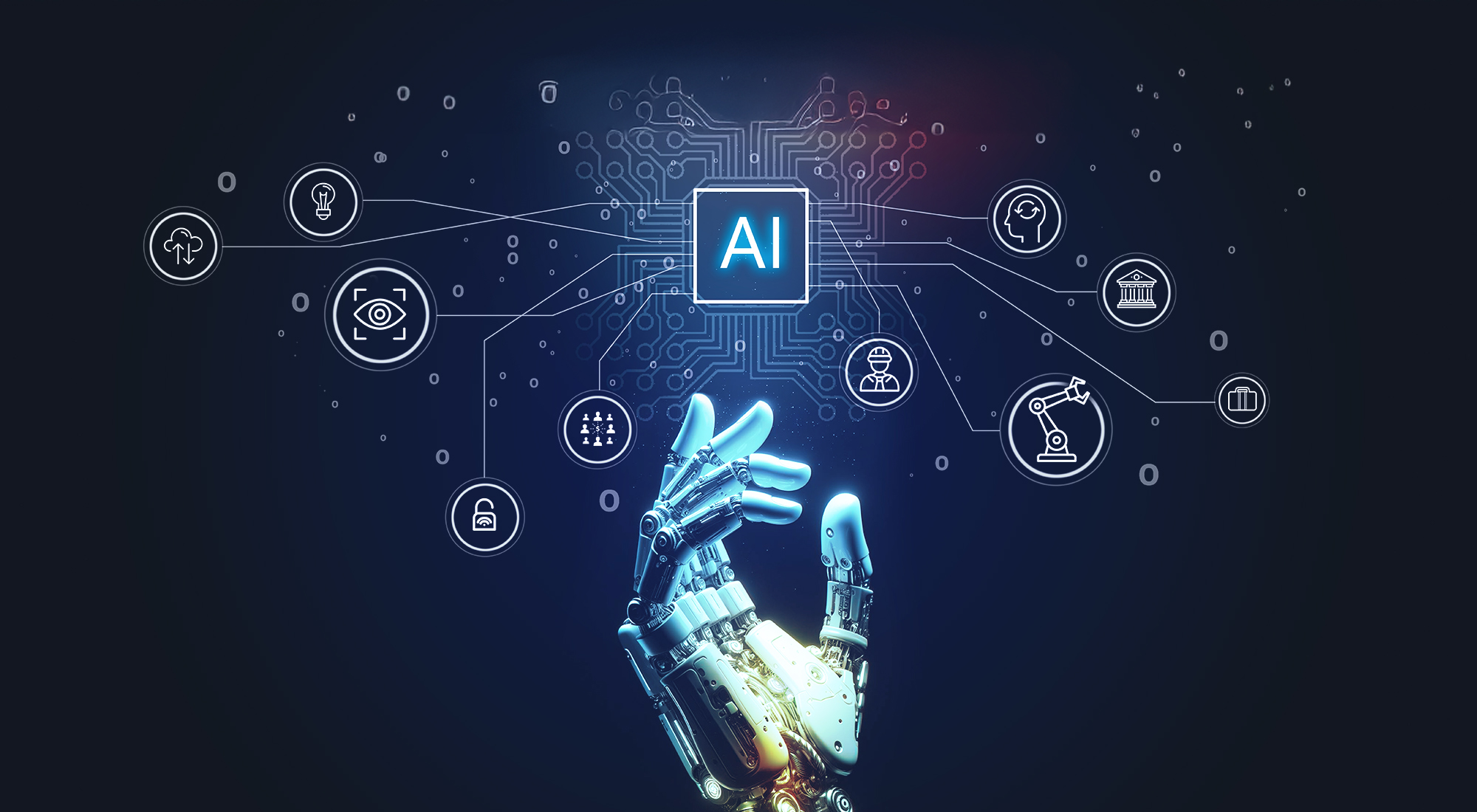

.jpg)

.png)
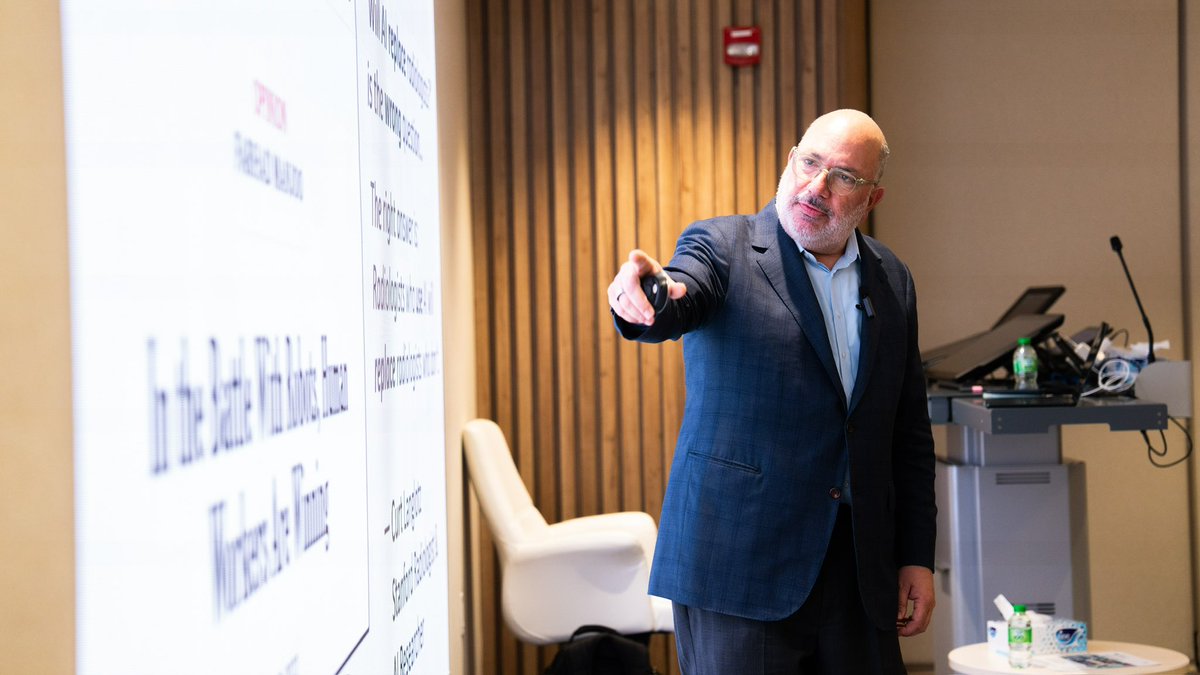





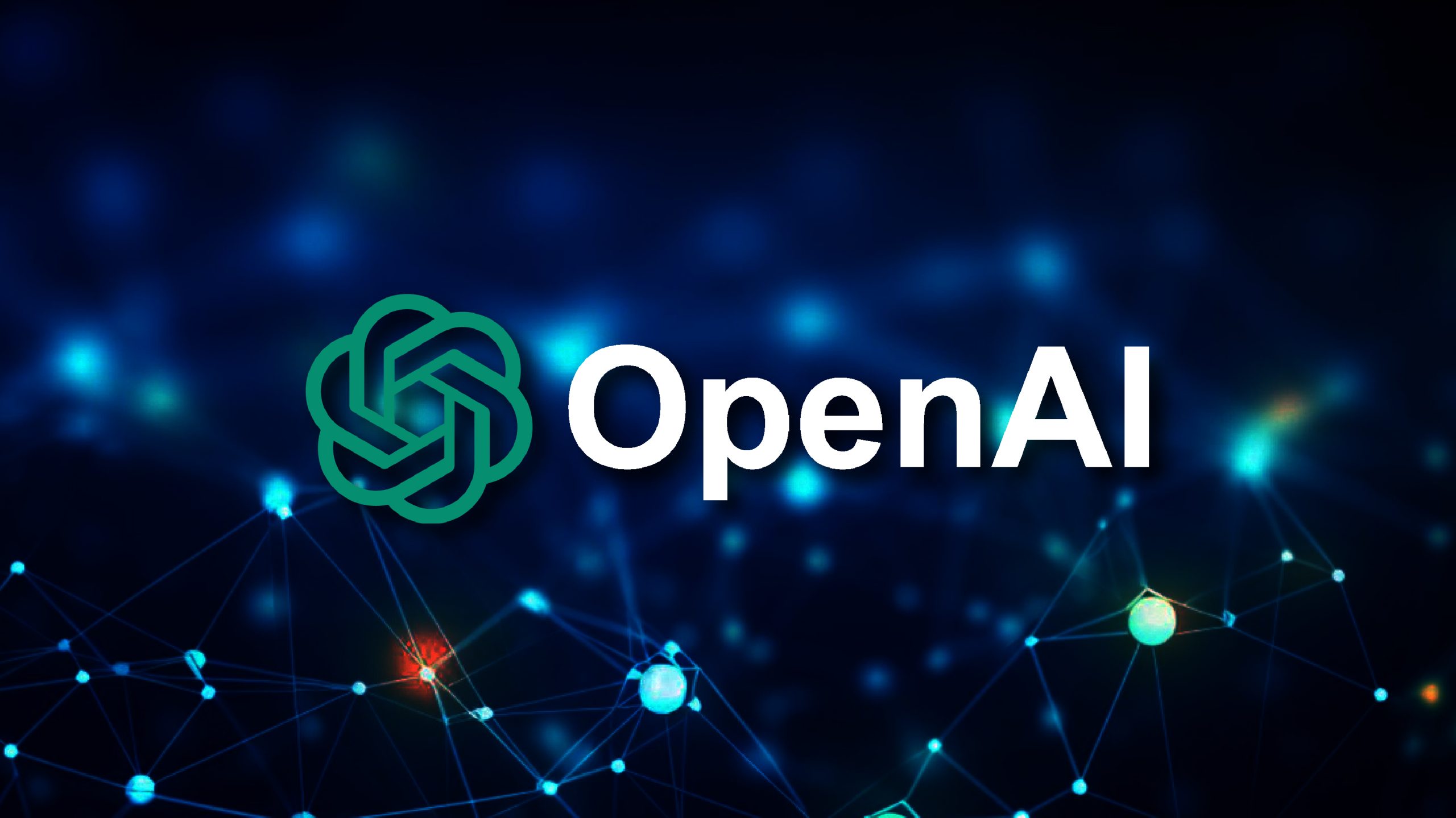



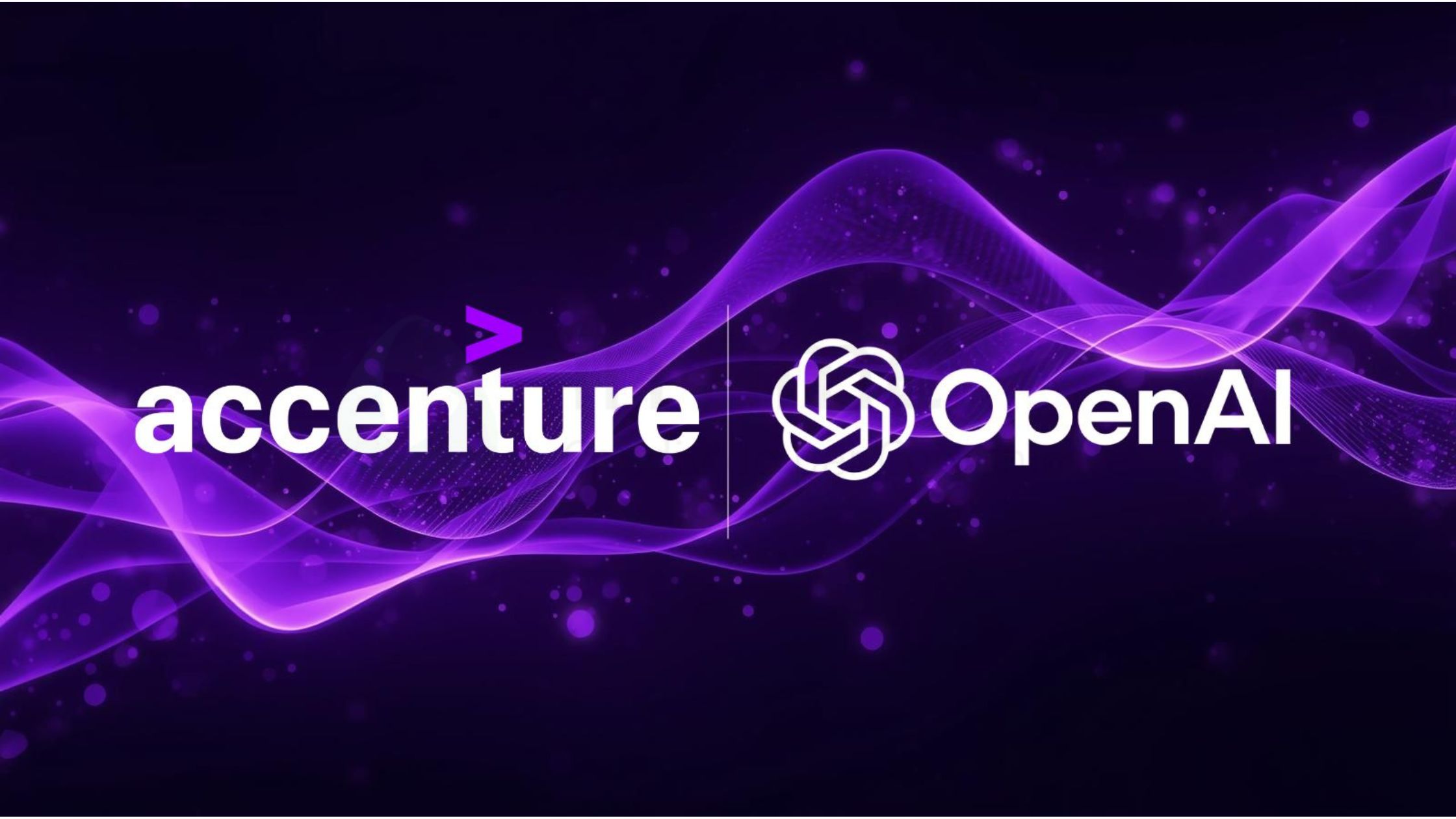
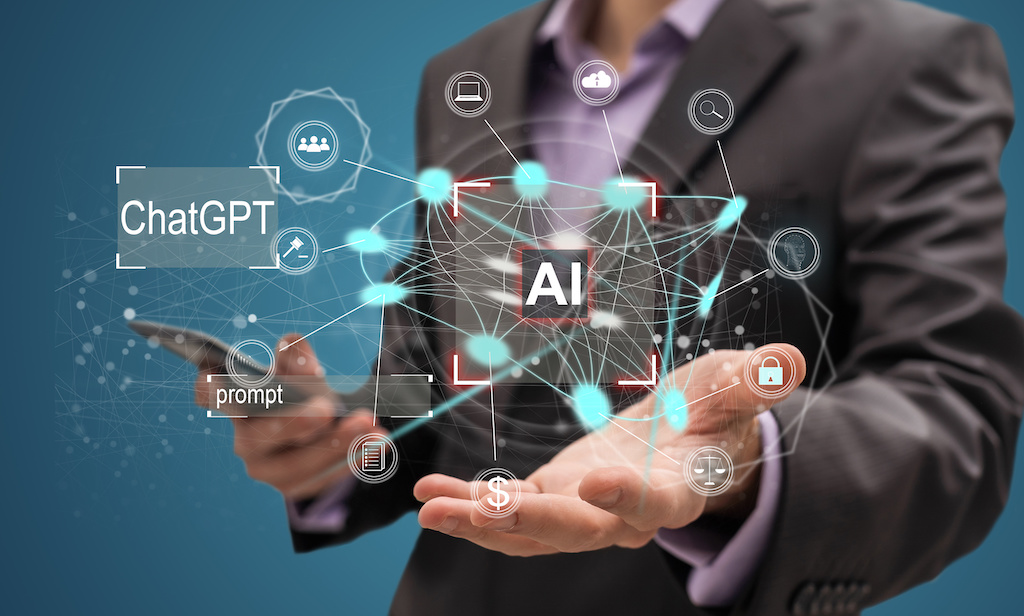






























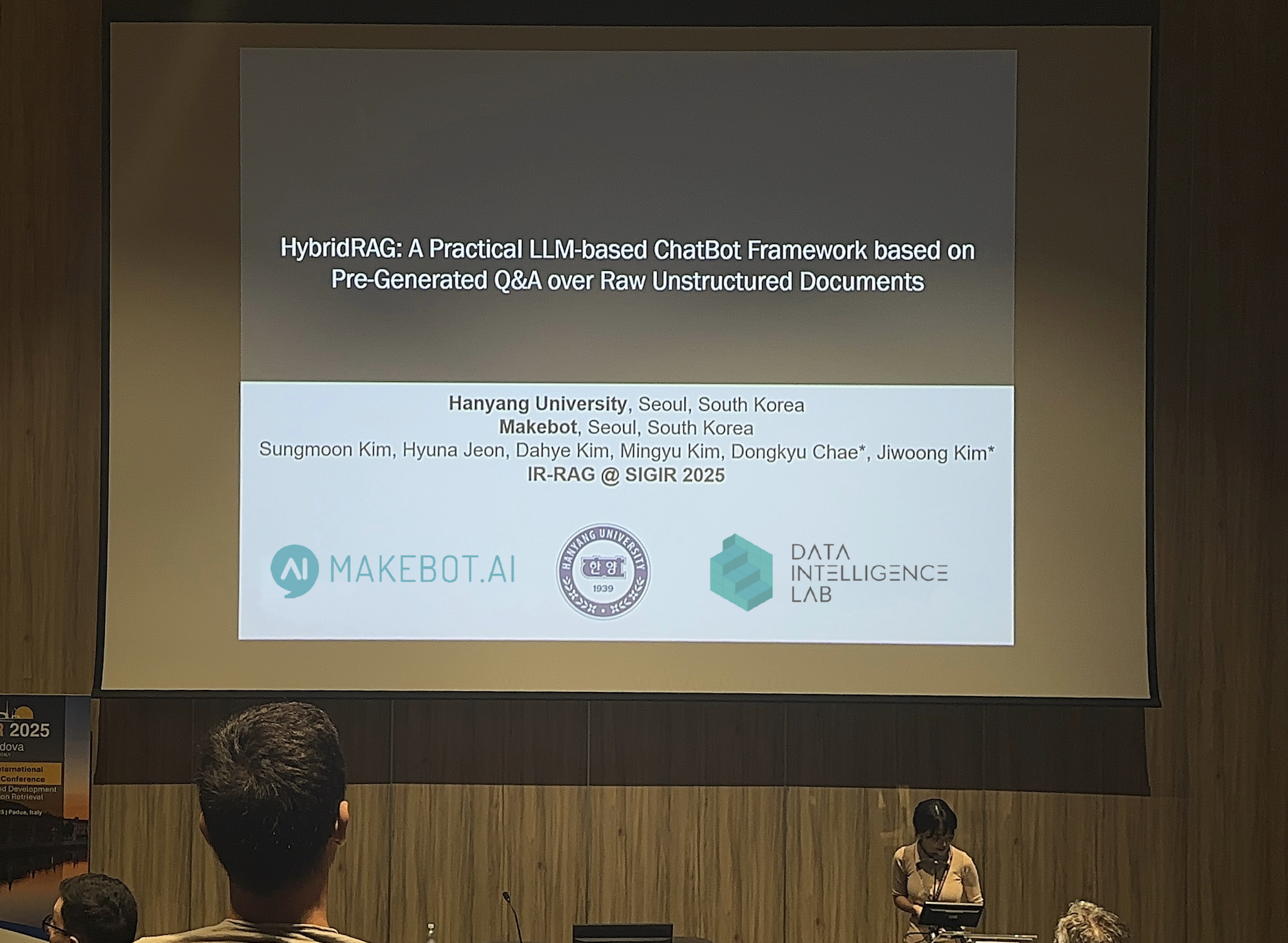









_2.png)


















.jpg)



















